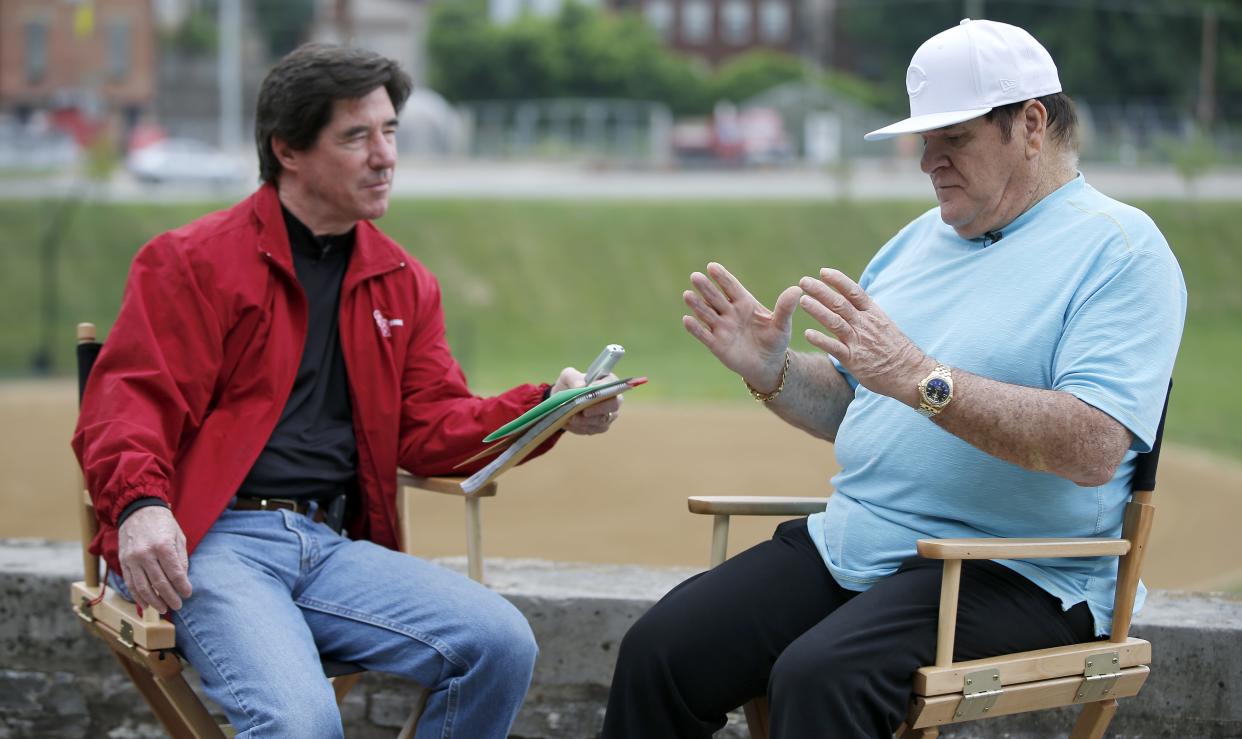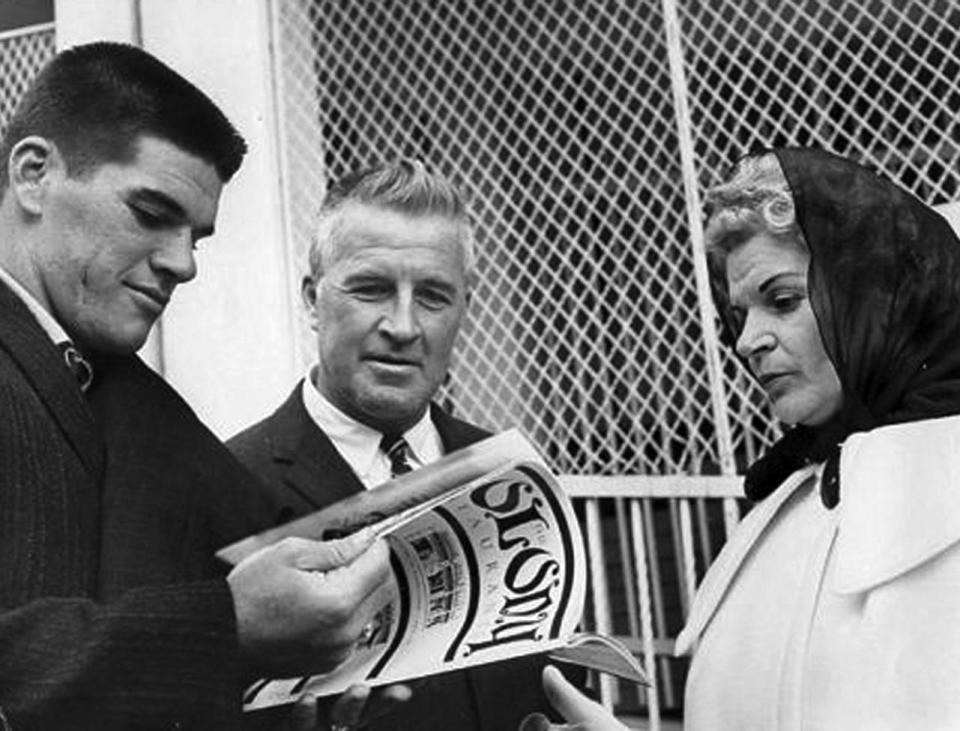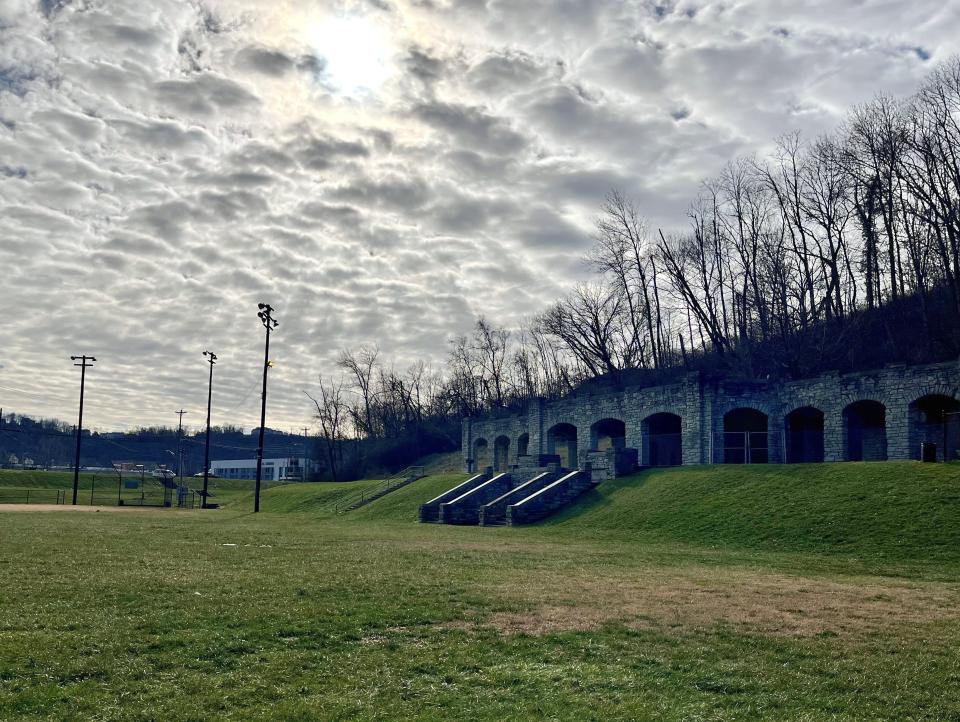Classic Doc: Pete Rose is the boy from Braddock Street

- Oops!Something went wrong.Please try again later.
Editor’s note: With columnist Paul Daugherty retiring this month, we are revisiting some of his classic columns from his time at The Enquirer. This interview with Pete Rose at his boyhood home in Riverside appeared in print on June 14, 2015.
The boy from Braddock Street
Pete Rose walks up a familiar hill in Riverside and back 60 years
The walk into his past isn’t easy. Pete Rose hobbles back in time to his boyhood home, because his knees ache and he’s put on a few pounds and because he is 74 years old. Baseball is youth and Pete Rose was baseball, but all that’s in the past now.
“This was all clear, through here,” he is saying. Pete points to a wall of green, a mess of weeds and overgrowth that now defines the view from the front of the house on Braddock Street in Riverside, where he grew up. Pete’s not a man seeking his past – I asked him to bring me here – but he’s still a bit beholden to it. And in peculiar awe.
“It don’t look the same,” he says.
I ask him to knock on the door. He demurs. “Don’t want to inconvenience ’em,” Pete says, so we walk around to the backyard instead, where a basketball hoop once loomed not five feet from the kitchen window. Just up the hill, Pete and his friends had carved out a makeshift ball field. The hoop is gone. Nature has done its work on the ball field. “When I lived here, it was kept up,” he says.

Weeds own the view. Trees have grown tall, overgrowth covers the path where 8-year-old Pete would sled ride, all the way down to Schulte’s Fish House. From the front porch, you could see the Ohio River nearly half a mile away. Now?
“I don’t remember everything being so cluttered,” Pete says.
The All-Star Game is coming in a few weeks and with it, memories of a less fettered Pete Rose. His life was a whole lot simpler with a bat in his hand. He won three world championships, he passed the great Cobb, he managed the young Reds to the brink before Lou Piniella took them over the top. We all know what happened next.
With age come complications. Things get cluttered, for better or worse. Pete Rose, once as simple a personality as existed, kept the extraneous noise at bay for a very long time, until it gathered in one mighty wave and swept him away. What’s left is a lingering, low-grade tragedy, in the person of a man whose view was perfectly clear for such a long, glorious time.
“You gotta remember,” Pete says, “all we did was play ball. That was all we had.”
A lot to live up to
Harry Rose wouldn’t let Pete go to the movies. There was a theatre across River Road from Bold Face Park, as Pete recalls. This was the late 1940s, when attending Saturday matinees was a rite of school-age passage. Harry worried about his first-born son’s eyesight. “He wanted me to be a hitter,” Pete says.

Harry worked at a bank downtown, crunching numbers. It was just a job. His passion was sports, specifically semi-pro football. At home and work, Harry was polite and unassuming. On the gridiron, he was an abject load.
His Riverside Athletic Club team might draw a weekend afternoon crowd of 5,000. Harry’s grit was legendary. He was a smallish man (about 5-foot-8, maybe 175 pounds) playing a large man’s game, and owned a competitiveness not often seen.
Harry once appeared on a TV show where he was asked to demonstrate proper tackling technique. He launched himself at a director’s chair, sending splinters all over the set. “I saw him break his hip, then crawl trying to make the tackle,” Pete recalls. Little Pete was a ball boy and water boy at his dad’s games. He’d pass around the hat at halftime, for money to pay the referees. “I saw him get a (knot) on his elbow big as a softball. He put a bandage on it with some ice, then intercepted a pass and ran 70 yards for a touchdown the next play.
“Every once in awhile, someone in (Las) Vegas will come up to me and say, ‘My dad played against your dad, and he was a son of a b----. Which he was.”
Harry Rose was not the prototype helicopter dad, but he wanted things done a certain way. He had Pete switch-hitting at age 9, a skill Pete perfected over the years, using the wall of Schulte’s as a backstop. Pete had a broom handle, his younger brother Dave a rubber ball.
“I’d let him get as close as he wanted,” Pete says. “The closer he got, the harder it was to hit. Hour after hour, he’d try to strike me out. I wore that wall out.”
The family never went on summer vacations, because summer was when Pete played ball, and Harry made deals with all of Pete’s coaches:
If they agreed to allow Pete to bat left-handed versus right-handed pitchers, and vice versa, Harry would guarantee his son’s attendance at every game and practice. “He didn’t think it was fair to the team, for one of the star players to go on vacation,” Pete says.
Harry Rose tested himself. Maybe it offered a break from the sedentary monotony of the bank. Or maybe it was Harry being Harry. Every day at close to 5 p.m., he’d get off the public bus at River Road and Cathcart Street. Cathcart slopes steeply uphill, not 45 degrees, but close.
Harry would sprint up Cathcart in his patent-leather work shoes, make the right onto Braddock and sprint to his house at the end of the lane. Every day. “Who does that sound like?” Pete asks.
Pete recalls that on Sundays, Harry would visit his mother, who lived up River Road maybe a mile and a half. Harry would leave his house, take the Anderson Ferry across to Kentucky, walk several miles upriver, cross a bridge back to the Ohio side, then visit his mother. “Just for the exercise,” Pete says.
When Pete was in the minor leagues, all of Harry’s letters ended, “Love, Dad. Keep hustling.”
In 1953, a reporter for one of the local papers wrote of Harry, “He is 41 years old, father of four, still can run 100 yards in 10.5 seconds.” When Harry was 58, he challenged 29-year-old Pete to a 40-yard dash, while both were at Colerain High School for an offseason Reds charity basketball game. Harry won. Two weeks later, Harry died of a heart attack. Pete got the news from his sister while he was across the river getting a haircut.
“If he wasn’t like he was, he might have lived longer. My dad was never sick. He never missed a day of work,” Pete says. Harry felt sick that day, though. Pain in his chest. He didn’t ask for help. He caught the bus home, made it to the top of the steps, saw his wife and died.

A lot lived on
Lots of Pete lived on through Harry. We are at Bold Face Park on a recent afternoon, sitting atop a massive stone structure that once contained changing rooms for the park’s two swimming pools, long since filled in. We climb a flight of steps to the top. Pete looks across the park, its two softball fields neat and recently groomed.
“I lived over there in the summer,” he says, pointing to a three-story, red-brick rowhouse on the opposite edge of the park. That would be his grandmother’s place. Eva Sams lived on the third floor, alone but for a pet monkey named, yes, Pete. “The meanest SOB,” Pete Rose says. “It would bite everybody, then hide in the rafters.”
Pete lived with Eva, because the baseball wasn’t very good four miles down the river, where Braddock Street was. Pete (and Harry) wanted Pete to play against the best. So his Knothole summers were lived with grandma.
“I was pretty lucky we had all this,” he says. “I developed right here, just by playing. If that field was open, we were on it. I just walked across the street. I had my bat, my glove and my ball.”
Life didn’t move a lot in those summers. It lolled, like the river. It might have been boring for anyone not named Pete Rose. His singleness of purpose afforded no time for boredom. Even when he left for Geneva, N.Y., and his first minor-league season, Rose returned to Braddock Street at season’s end, swinging a leaded bat 150 times every night, each side, left and right, before he went to bed.
The whir of the bat would wake up Harry. “My uncle (his mother’s brother and part-time Reds scout Buddy Bloebaum) told me it would make my arms bigger.”
After awhile, Rose surveys Bold Face Park and declares, “I don’t miss this place. I can’t play no more. The pools are gone. At 3:30 this afternoon, there won’t be no kids playing” on the tidy fields below. When we walk down from atop the stone building at the edge of Bold Face Park, Pete takes each step sideways. He limps some.
Back up on Braddock, Pete kicks at the gravel-and-grass front yard, and wonders where the big tree went. “I used to climb that tree,” he says. He’s not nostalgic, he’s not romantic, so there is no point in asking Peter Edward Rose if he ever wishes he could go back and do it all over again, armed with what he knows now.
I want to ask him this, though, because the answer would be essential to who he was and who he has become: “Pete, with everything good you took from this place, and from the father that raised you – your jaunty attitude, your endless passion and striving, your regular-guy appeal – how could you possibly have ended up in the place you’re in now?”

An uncluttered man, whose virtue was his focus, is now burdened by regret, and by a frayed legacy that will never be what it should have been, what he intended so long ago, while slamming switch-hits past his brother in the parking lot at Schulte’s.
But I don’t. I don’t ask Pete this, because he will never give me the answer I’m looking for. Rose is candid. He isn’t introspective. There’s a life’s worth of difference.
Instead, I ask: “What would your dad say to you right now, if he were standing with us in front of this house where he raised you?”
“He’d say, ‘How come you’re not up there working with your grandson, teaching him how to hit’?”
Pete looks down, kicks some gravel, changes the subject. “I can’t believe all these trees grew in 40 years,” he says.
“Forty years is a long time,” I say.
“It is,” says Pete Rose.
This article originally appeared on Cincinnati Enquirer: Pete Rose interview at childhood home in Cincinnati, Boldface Park

